#Sarah Thankam Matthews
Photo
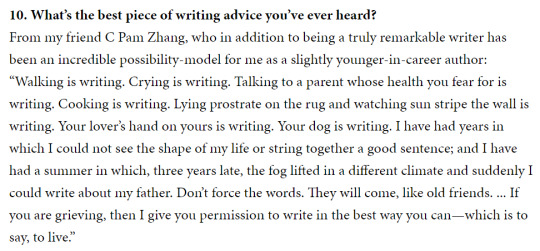
Sarah Thankam Mathews, author of All This Could Be Different (Viking, 2022), in “Ten Questions”
#Sarah Thankam Matthews#C Pam Zhang#All This Could Be Different#Ten Questions#Writer's Block#Writer's Life#Quote#Inspiration#Fiction#Viking#2022
65 notes
·
View notes
Note
3, 11, 14, 19, 24? :)
hi anon! thank you :)
3. Favorite musical artist / group you started listening to this year?
answered here
11. Something you want to do again next year?
travel! historically i am not a fan of traveling but i enjoyed it this year and i'm excited for things i have planned next year.
14. Favorite book you read this year?
god that's so hard.
i'd probably say it's a toss up between salt houses by hala alyan, a place for us by fatima farheen mirza, and all this could be different by sarah thankam matthews. i can't choose a favorite they're all my favorites
19. What’re you excited about for next year?
one of my cousins is getting married and the wedding is in portugal, and i'm already counting down the days to that. i have another wedding i'm going to at the end of march i'm excited about, and also... fresh starts and changes and new people and experiences. i don't like resolutions but something about a new year feeling like a fresh start and a chance to reflect and make changes has always brought me a lot of comfort
24. Did you keep any New Year’s Resolutions?
as mentioned above resolutions aren't my favorite because they stress me out lol but i read a lot of good books this year which i enjoyed! i also got a job that i love and not only stuck to, but got deeper into running this year, and i'm very happy about that
3 notes
·
View notes
Note
Did you get any books for Christmas? And what are they?
I don’t celebrate Christmas, but nope, did not get any for Chanukah either ;) I did treat myself to one at my favorite holiday, though - the B&N hardcover sale. (THIS COULD BE SO DIFFERENT by Sarah Thankam Matthews.)
15 notes
·
View notes
Text
things i want to read next year:
i want to die but i want to eat tteokbokki by baek sehee
i’m glad my mom died by jannette mccurdy
heaven by mieko kawakami
all the lovers in the night by mieko kawakami
11.22.63 by stephen king
in the miso soup by ryu murakami
blueberries by ellena savage
last night at the telegraph club by malinda lo
the great gatsby by f. scott fitzgerald
my year of rest and relaxation by ottessa mosfegh
the unabridged journals of sylvia plath
TERRY PRATCHETT omg
crying in the bathroom: a memoir by erika l. sanchez
macbeth by william shakespeare
the lesbiana’s guide to catholic school by sonora reyes
babel, or the neccesity of violence: an arcane history of the oxford translators' revolution by r. f. kuang
the unbereable lightness of being by milan kundera
everyone in this room will someday be dead by emily r. austin
all this could be different by sarah thankam matthews
the death of ivan ilyich by leo tolstoj
things i want to REREAD:
catcher in the rye by j.d. sallinger
the secret history by donna tartt
no longer human by osamu dazai
#yes i havent read macbeth sue me#one of two school readings i missed#another one being hamlet#sorry willy#this is so random#yes i MIGHT be crazy#but then i will have four month vacation#after my finals#i'll read them all if i graduate i promise#thought about rereading little life BUT HELL NO#feel free to take some inspirations#OOOH AND ALSO YELLOWFACE BY R. F. KUANG#but only if it gets published in my first language#im not that fluent#2023#tbr
4 notes
·
View notes
Photo
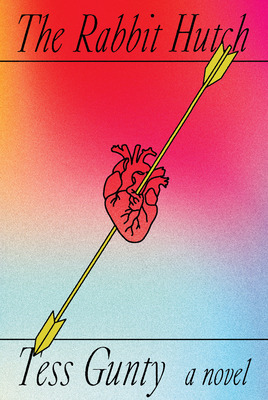
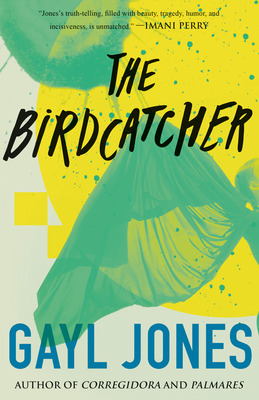
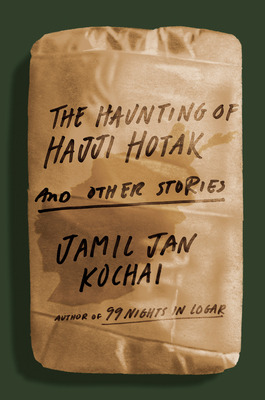

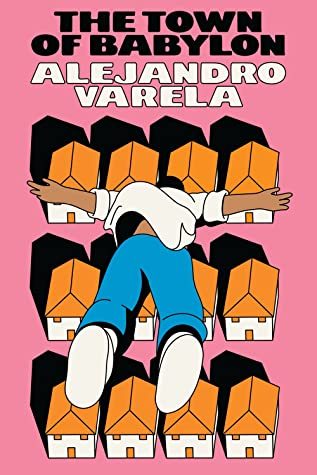
National Book Award Finalists: Fiction
Have you read any of these National Book Award Finalists? These fiction selections were chosen out of 463 submissions! There are also finalists for nonfiction, poetry, translated literature, and young people's literature - be sure to check out the full list here.
The Rabbit Hutch by Tess Gunty
The automobile industry has abandoned Vacca Vale, Indiana, leaving the residents behind, too. In a run-down apartment building on the edge of town, commonly known as the Rabbit Hutch, a number of people now reside quietly, looking for ways to live in a dying city. Apartment C2 is lonely and detached. C6 is aging and stuck. C8 harbors an extraordinary fear. But C4 is of particular interest.
Here live four teenagers who have recently aged out of the state foster-care system: three boys and one girl, Blandine, who The Rabbit Hutch centers around. Hauntingly beautiful and unnervingly bright, Blandine is plagued by the structures, people, and places that not only failed her but actively harmed her. Now all Blandine wants is an escape, a true bodily escape like the mystics describe in the books she reads.
Set across one week and culminating in a shocking act of violence, The Rabbit Hutch chronicles a town on the brink, desperate for rebirth. How far will its residents - especially Blandine - go to achieve it? Does one person’s gain always come at another’s expense? Tess Gunty’s The Rabbit Hutch is a gorgeous and provocative tale of loneliness and community, entrapment and freedom. It announces a major new voice in American fiction, one bristling with intelligence and vulnerability.
The Birdcatcher by Gayl Jones
Gayl Jones, the novelist Toni Morrison discovered decades ago and Tayari Jones recently called her favorite writer, has been described as one of the great literary writers of the 20th century. Now, for the first time in over 20 years, Jones is publishing again. In the wake of her long-awaited fifth novel, Palmares, The Birdcatcher is another singular achievement, a return to the circles of her National Book Award finalist, The Healing.
Set primarily on the island of Ibiza, the story is narrated by the writer Amanda Wordlaw, whose closest friend, a gifted sculptor named Catherine Shuger, is repeatedly institutionalized for trying to kill a husband who never leaves her. The three form a quirky triangle on the white-washed island.
A study in Black women's creative expression, and the intensity of their relationships, this work from Jones shows off her range and insight into the vicissitudes of all human nature - rewarding longtime fans and bringing her talent to a new generation of readers.
The Haunting of Hajji Hotak by Jamil Jan Kochai
Pen/Hemingway finalist Jamil Jan Kochai breathes life into his contemporary Afghan characters, exploring heritage and memory from the homeland to the diaspora in the United States, in the spiritual and physical lands these unforgettable characters inhabit.
In “Playing Metal Gear Solid V: The Phantom Pain,” a young man’s video game experience turns into a surreal exploration on his own father’s memories of war and occupation. Set in Kabul, “Return to Sender” follows two married doctors driven by guilt to leave the US and care for their fellow Afghans, even when their own son disappears. A college student in the US in “Hungry Ricky Daddy” starves himself in protest of Israeli violence against Palestine. And in the title story, “The Haunting of Hajji Hotak,” we learn the story of a man codenamed Hajji, from the perspective of a government surveillance worker, who becomes entrenched in the immigrant family’s life.
The Haunting of Hajji Hotak and Other Stories is a moving, exploration and narrative of heritage, the ghosts of war, and home - and one that speaks to the immediate political landscape we reckon with today.
All This Could Be Different by Sarah Thankam Matthews
Graduating into the long maw of an American recession, Sneha is one of the fortunate ones. She's moved to Milwaukee for an entry-level corporate job that, grueling as it may be, is the key that unlocks every door: she can pick up the tab at dinner with her new friend Tig, get her college buddy Thom hired alongside her, and send money to her parents back in India. She begins dating women - soon developing a burning crush on Marina, a beguiling and beautiful dancer who always seems just out of reach.
But before long, trouble arrives. Painful secrets rear their heads; jobs go off the rails; evictions loom. Sneha struggles to be truly close and open with anybody, even as her friendships deepen, even as she throws herself headlong into a dizzying romance with Marina. It's then that Tig begins to draw up a radical solution to their problems, hoping to save them all.
The Town of Babylon by Alejandro Varela
In this contemporary debut novel - an intimate portrait of queer, racial, and class identity - Andrés, a gay Latinx professor, returns to his suburban hometown in the wake of his husband’s infidelity. There he finds himself with no excuse not to attend his twenty-year high school reunion, and hesitantly begins to reconnect with people he used to call friends.
Over the next few weeks, while caring for his aging parents and navigating the neighborhood where he grew up, Andrés falls into old habits with friends he thought he’d left behind. Before long, he unexpectedly becomes entangled with his first love and is forced to tend to past wounds.
Captivating and poignant; a modern coming-of-age story about the essential nature of community, The Town of Babylon is a page-turning novel about young love and a close examination of our social systems and the toll they take when they fail us.
#fiction#national book award#library books#TBR pile#tbr#to read#book recommendations#book recs#reading recommendations#reading recs#booklr#book tumblr
4 notes
·
View notes
Text
How many books did you read this year? not sure, I didn't keep track until like october unfortunately. But 70+
Did you reread anything? What? I reread Lirael/Sabriel/Abhorsen by Garth Nix which I've read like 4 or 5 times. my favorite YA fantasy of all time
What were your top five books of the year? Top 17 in no particular order:
The Book of Form and Emptiness by Ruth Ozeki
Care Work by Leah Lakshmi Piepnzna-Samarasinha
The Dawn of Everything by David Graeber and David Wengrow
Paul Takes the Form of a Mortal Girl by Andrea Lawlor
Crying in H Mart by Michelle Zauner
Briefly, a Delicious Life by Nell Stevens
The Electricity of Every Living Thing by Katherine May
The Membranes by Chi Ta-wei
All This Could Be Different by Sarah Thankam Matthews
Sterling Karat Gold by Isabel Waidner
Old Enough by Haley Jakobson
Chlorine by Jade Song
The Centre by Ayesha Manazir Siddiqi
The World Cannot Give by Tara Isabella Burton
Our Share of Night by Mariana Enriquez
Extremely Online by Taylor Lorenz
Love by Toni Morrison
Did you discover any new authors that you love this year? Yes I read two books by Ruth Ozeki and loved both. I also got more into David Graeber, I read Debt and Bullshit Jobs at the end of last year and really enjoyed The Dawn of Everything this year.
What genre did you read the most of? Hard to say since again I didn't keep track of everything and I haven't used goodreads in a couple years lol bc its owned by amazon but I would say leftist/leftist leaning nonfiction, contemporary fiction written by women and queer people, and fantasy/magical realism.
Was there anything you meant to read, but never got to? So much lol. But the oldest books on my tbr are No Touching by Ketty Rouf, Nature is a Human Right by Ellen Miles, Overtime by Will Stronge and Kyle Lewis, Ecrits by Jacques Lacan, and New Animal by Ella Baxter
Did you meet any of your reading goals? Which ones? Did not have any but I read way more than I have since I was in high school so I'm so happy about that!
Did you get into any new genres? I hadn't read a lot of magical realism (non heavy fantasy) that I'd really enjoyed before.
What was your favorite new release of the year? The World Cannot Give by Tara Isabella Burton, Our Share of Night by Mariana Enriquez, or All This Could Be Different by Sarah Thankam Matthews
What was your favorite book that has been out for a while, but you just now read? Geek Love by Katherine Dunn I think was the oldest book I read this year that I really liked. Or People's History of the United States by Howard Zinn is also a strong contender. Or Illness as Metaphor and AIDS and Its Metaphors by Susan Sontag. Or Love by Toni Morrison.
Any books that disappointed you? While I really enjoyed Tomorrow and Tomorrow and Tomorrow by Gabrielle Zevin and I would recommend it, I do think it has been somewhat overhyped and failed to live up to my expectations in some respects. I also did not enjoy Venco by Cherie Dimaline as much as I wanted to, given the premise is like a perfect intersection of things I enjoy in books. Try Her Majesty's Royal Coven by Juno Dawson instead, or the Left-Handed Booksellers of London by Garth Nix for similar vibes but way more enjoyable.
What were your least favorite books of the year? I usually DNF books I don't like so hard to say for sure. Milk Fed by Melissa Broder was really not my vibe. I wasn't really surprised because I couldn't stand her previous book about the mermaid(?) but I did like her So Sad Today stuff. I also liked Norwegian Wood exactly as much as I was expecting to, which was, not very much. I've also decided I don't really enjoy reading short story collections.
What books do you want to finish before the year is over? I am currently reading My Tiny Life by Julian Dibbel and Fossil Capital by Andreas Malm, both of which are very dense and I have kind of been sloughing through. Both are super interesting though so hopefully I finish them by the end of the month instead of just reading fiction which I read way faster.
Did you read any books that were nominated for or won awards this year (Booker, Women’s Prize, National Book Award, Pulitzer, Hugo, etc.)? What did you think of them? I just looked at the lists for all the awards listed here and literally the only book I read was Legends and Lattes by Travis Baldor which was nominated for best novel at this years Hugo awards LOL. I added some other ones to my tbr though. I thought it was fun but nothing incredible! I'll read the sequels (my standard of quality for fantasy is a lot lower than other genres lol)
What is the most over-hyped book you read this year? Def Tomorrow and Tomorrow and Tomorrow by Gabrielle Zevin even though it WAS really good!
Did any books surprise you with how good they were? Yes I was not expecting to enjoy Pageboy by Elliot Page as much as I did! Really well done celebrity memoir. Also I was worried that Extremely Online by Taylor Lorenz would just be about stuff I already knew but it was actually super interesting and went down a bunch of rabbit holes I didn't know a ton about and had great analysis.
How many books did you buy? Way too many. But mostly very cheap on Thriftbooks!
Did you use your library? Oh boy, you wouldn't even believe.
What was your most anticipated release? Did it meet your expectations? I was very excited for README.txt by Chelsea Manning and it did not disappoint (yes it came out in 2022 but I took a second to get to it okay). I also had The Free People's Village by Sim Kern on hold way before it came out and I really enjoyed it!
Did you participate in or watch any booklr, booktube, or book twitter drama? no lmao. i watched a couple youtube videos about tiktok book drama and it was the stupidest shit ive ever seen
What’s the longest book you read? Probably Our Share of Night by Mariana Enriquez. I did listen to it on audio which is the only way I am really able to get through books that long. The longest book I read with my eyes was probably The Book of Form and Emptiness by Ruth Ozeki.
What’s the fastest time it took you to read a book? This is a silly question bc I read some pretty short books. Several books under two hundred pages only took me a few hours.
Did you DNF anything? Why? so much stuff i can't even explain
What reading goals do you have for next year? Keep reading at the pace I am now! and hopefully keep track of the books this time, but not feel pressured to share about books im reading if I don't want to
1 note
·
View note
Text
As Things Go Back to ‘Normal,’ What Happens to Mutual Aid?
“I feel like the future of mutual aid, for me, holds both promise and fear,” Sarah Thankam Mathews told me over Google Hangouts one morning. In March 2020, after listening to the news of the COVID-19 virus ravaging Wuhan, China and Italy, she understood there were only a few days before the United States found itself under lockdown. And she was right.
In an effort to control the drip of inevitable disarray from the pandemic, she posted fliers with an invitation for her Bed-Stuy neighbors to “stay connected and care for each other as a community” with a link to a Slack hub: “As things get hard, we show up for our neighbors. <3” The first day, the chat gained 60 members and by the next day there were 100; during their first virtual meeting, 65 participants joined to discuss how they would address and help fight against the economic, living, and food disparities the pandemic only made worse. This was the foundation of Bed-Stuy Strong, a mutual aid network that has supported 28,000 central Brooklynites with groceries and collected $1.2 million in crowdsourced funds to put back into the neighborhood in an attempt, as Mathews puts it, “to address some fraction of the skyrocketing community need around hunger.” In the later half of the pandemic, the group also organized neighborhood clean-ups and a summer block party to provide some relief during a difficult time.
“Mutual aid is predicated on the idea that everybody can help and everybody has needs. And it's about our communities meeting our communities' needs,” says Mathews. Despite the challenges, Matthews believes that mutual aid is the future.
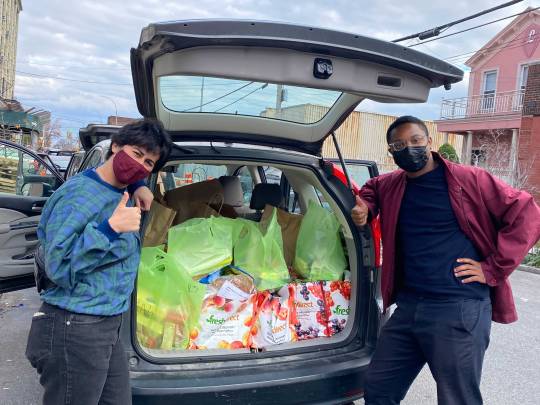
Volunteers with Bed-Stuy Strong. Image: Bed-Stuy Strong
Last year, as the entire world went into lockdown and movements to address and account for the racist, classist violence that the pandemic only made worse, there was a dramatic proliferation of mutual organizations like Bed Stuy Strong. Since March 2020 the Brooklyn-based organization has helped 28,000 Central Brooklynites with groceries and distributed $1.2 million worth of crowdsourced donations into the neighborhood. The New York Times cited at least 100 such networks across New York state and 800 nationwide according to data from Mutual Aid Hub.
But as more people in the United States have become vaccinated, lockdown measures are softening, and our push to go back to “normal” is happening, there’s been a decrease in donations to to mutual aid organizations as some networks in Washington D.C. have had to cut down on the frequency of their cash and grocery deliveries and have struggled to retain volunteers. Now that things are going back to "normal," the support many people had for community solidarity could wane; as history shows, our debt to community suddenly becomes more attractive when our routines are disrupted.
Put simply—will mutual aid stick around in a "normal" world?
Though the pandemic helped make them a household term, mutual aid organizations are an American institution, the earliest of which dates back to American slavery. In Ariel Aberg-Riger’s visual article ‘Solidarity, Not Charity’: A Visual History of Mutual Aid, they explain the mission of one of the first Black mutual aid societies, called The Free African Society. Created in Philadelphia in 1787 by two religious men, Richard Allen and Absalom Jones, The Free African Society was quite literally born to help freed slaves adjust to a life outside of slavery. In 1896, Callie House created the Ex-Slave Mutual Relief, Bounty, & Pension Association to give pensions to Black workers emancipated after the Civil War like herself. Throughout American history, mutual aid networks like Chinese Consolidated Benevolent Association, Landsman-Shaftn, Sociedades Mutualistas, and The Young Lords Garbage Offensive have filled a void where government support has failed to close financial disparities caused by racial discrimination, natural disasters, the “sleep when you’re dead” mantra of capitalism. One shared characteristic between these support networks is that they pop up during periods of social upheaval, societal strife, and turmoil. Some are still around, while others like The Young Lords are not, but can look back on their legacy of community activism with admiration. The giving that came during the COVID-19 pandemic and racial justice protests that came after the police killing of George Floyd was history repeating itself as communities pressed together to stay alive. But if history is a pattern, we ought to be worried about whether the good work done last year will continue into the future.
“The teeth have been pulled, the flames [have] been taken away. Now it’s just another 501c3,” says former Black Panther Party organizer and co-founder of Common Ground Relief, Malik Rahim, about the mutual aid organization that he founded in September 2005. At its height, Common Ground was created to support neighbors in the Greater New Orleans area in the aftermath of Katrina. They’ve created free legal and health clinics, built affordable and energy efficient housing, and worked on soil restoration under Common Ground Relief Wetland Restoration. All of their initiatives, with the help of more than 20,000 volunteers over the years, were propelled by a desire to work outside of the government to take care of their own.
“No one in the history of this country can make this type of claim. And we did it in spite of the government, not with governmental support, but in spite of the government,” he said.
Money makes the world go ‘round and as we slowly inch toward some semblance of a post-pandemic life, mutual aid networks need monetary support to keep the lights on. If those in positions to donate financially turn their backs on these local systems, they won't be able to survive. Mathews worries about volunteers burning out and struggling to find people to commit hours and resources to the cause. “A lot of people who got the most active in mutual aid networks in the last year, from my perspective, across the country, tended to be people who wanted to help” and invest in the wellbeing of neighbors, she said. Community is nothing without an investment in upward mobility, reclamation of rights taken from BIPOC groups and other minority groups—without community, we’re simply neighbors sharing space without an incentive to sustain our area.
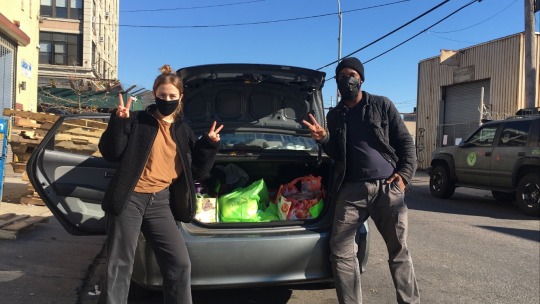
Volunteers with Bed-Stuy Strong. Image: Bed-Stuy Strong
“Now, the sad part about it is our government, our nation, [is] when we prepare families as individuals and not as a community and respond as a community…that's when you start really seeing how important working together is,” Rahim told me.
“So many people are hungry for community and deeper community too,” Mathews said, speaking about the emotional connection that comes with building community solidarity. “A lot of things are being sold to us as connections that aren't really connections. They’re commodified online networks that actually leave people feeling more lonely, and don't prevent alienation.” Mutual aid networks gave those with money a way to feel less lonely and less alienated. Some gave to feel like they were doing something in what felt like a helpless situation. Others donated because it may have helped with their guilt. Whatever the reason, they could see where their donations ended up.
As restrictions on life are slowly pulled back, we’re able to remember what a community feels like by visiting family members and spending time outside with friends. In the midst of re-experiencing in-person connections, it’s easy to see a shift in focus away from mutual aid onto repairing the distance in personal relationships the pandemic caused.
When funds dry up, it’s a domino effect that slows down and cuts corners around the very communal system fighting against that same inequity. If Common Ground Relief did not step in, there would be gaping holes where the government did not and if Bed-Stuy Strong was never created and funded, the Black, brown and other vulnerable groups in the area would have suffered through the pandemic even more—inevitably this kind of ripple effect would continue for other mutual aid organizations.
Mutual aid cannot survive without a group fighting for a common cause. Hurricane Katrina brought Common Ground to life just as COVID-19 brought Bed-Stuy Strong to Brooklyn. Investing in the shared spaces we live in creates community much like until you put your ingredients together and make them, only then do they come together to make a cake. Mutual aid can only thrive when we remember the feeling of accomplishment that comes from valuing our neighbors and fighting against the systems that harm so many.
As Things Go Back to ‘Normal,’ What Happens to Mutual Aid? syndicated from https://triviaqaweb.wordpress.com/feed/
0 notes
Note
Hi! Wondering if you have recs for adult fiction that would make a good book club read, particularly books featuring BIPOC characters? I'm thinking like Song of Achilles or Detransition Baby, but more diversity. Thank you!
Sure - try All This Could be Different by Sarah Thankam Matthews, Cantoras by Carolina di Robertis, On Earth We're Briefly Gorgeous by Ocean Vuong, or Real Life by Brandon Taylor, for a few.
12 notes
·
View notes